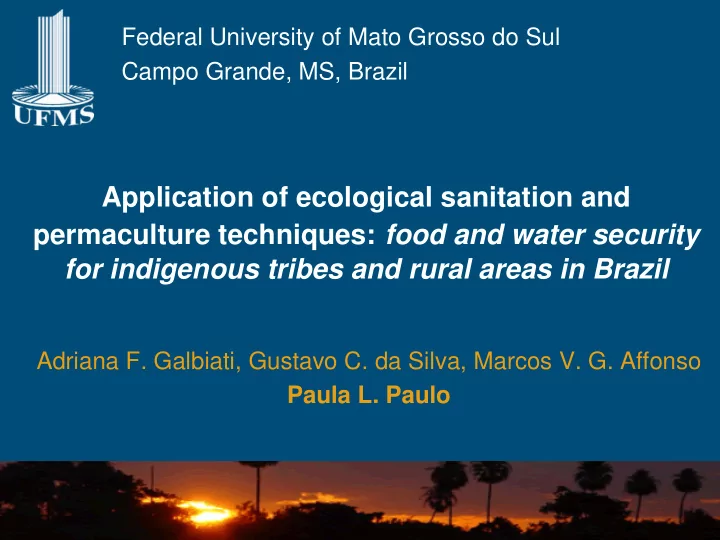

Federal University of Mato Grosso do Sul Campo Grande, MS, Brazil Application of ecological sanitation and permaculture techniques: food and water security for indigenous tribes and rural areas in Brazil Adriana F. Galbiati, Gustavo C. da Silva, Marcos V. G. Affonso Paula L. Paulo 1 26-31 aug 07
2 Location 26-31 aug 07
Background Kaiowa Tribe: situation overview • Poverty • Indians lost their identity (alcohol abuse, suicides) • Dependency on government food distribution • No river or water springs on their land • Available water: FUNASA’s well (distributed by taps and laundry areas – doesn’t reach whole population) • Poor soil • Deforestation 3 26-31 aug 07
Background Kaiowa Tribe: situation overview • Scenarios - water � Area where no water is provided � Area provided with taps � Area provided with laundry facilities 4 26-31 aug 07
Background Kaiowa Tribe: situation overview • Scenarios - sewage Open defecation - latrines Funasa module (mostly not accepted) 5 26-31 aug 07
Background Kaiowa Tribe: situation overview Challenge on project implementation: young children and old people don’t speak Portuguese Political conflicts within the tribe 6 26-31 aug 07
Objectives Main objective finding sustainable and accepted sanitation options, where FUNASA may financially help with implementation and the community itself can manage and improve their quality of life. • To promote and transfer the use of simple technologies based on ecological sanitation and permaculture concepts. • To provide sanitation, supporting the rational use of water and enabling the food production in indigenous and/or rural communities. 7 26-31 aug 07
Objectives • The project aims the capacity building of the population so that, when necessary, they can build, operate and manage the decentralised systems, strengthening their communities by promoting health and self-sufficiency on food production. 8 26-31 aug 07
Methodology • Research team visits the tribe 1 week/month (400 km) • Meetings, surveys, workshops • Educational training (school teachers) and special environmental education training on the complete system • Systems construction and implementation • Systems sampling, monitoring and maintenance • Physico-chemical and bacteriological analyses of treated greywater and rainwater • Parasitological tests: samples from arborloo pit and users. 9 26-31 aug 07
Methodology • workshop on construction techniques using bamboo • construction of 2 rainwater harvesting systems • construction of 20 arborloo-type toilets • constructed wetland for treating the school kitchen greywater (followed by a vegetable garden) • 2 banana tree circles treating the greywater produced in 2 communal laundry areas • 1 low tech urinal in the school (connected to a flower garden + greywater). 10 26-31 aug 07
11 Results - Rainwater 26-31 aug 07
12 Results – banana tree circles (laundry area) 26-31 aug 07
13 Results – constructed wetland 26-31 aug 07
14 Results – vegetable garden (greywater) 26-31 aug 07
15 Results – urinal, flower garden 26-31 aug 07
16 Results - arborloo 26-31 aug 07
17 Results - arborloo 26-31 aug 07
Results - arborloo Arborloo 1 Arborloo 2 Ascaris lumbricoides eggs Iodamoeba cysts Hymenolepis nana eggs Escherichia coli cysts Ancylostoma duodenale eggs Ancylostoma duodenale eggs Strongyloides stercoralis larvae Strongyloides stercoralis larvae Causes: bad hygiene habits, lack of infrastructure and basic sanitation and cultural habits Ongoing work: samples - arborloo and users, questionnaires (health, habits, symptoms, etc.) Survey: health care centre for indigenous people Looking for evidences that education programme together with ecosan and permaculture techniques improved their health conditions (by the end of the project). 18 26-31 aug 07
Conclusions • Good acceptance on the chosen techniques, specially the arborloo toilet. • Difficulties for the community to work as a group (household level activities presents better results). • Difficulties with the maintenance of the toilets: appearance of flies and bad odour (non addition of ashes or saw dust). • Hygienic condition of the toilets greatly improved after new visits to the houses. • Achievements improved after educational training at school. 19 26-31 aug 07
Conclusions • For the success of the project implementation it is of paramount importance the educational work and population participation, which goes beyond the transfer of technology. 20 26-31 aug 07
Thanks for the attention! 21 26-31 aug 07
Recommend
More recommend